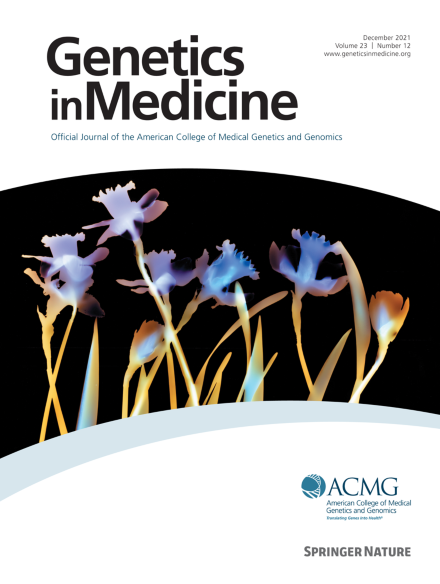初级保健提供者对遗传性癌症风险评估和检测的做法、态度和信心:混合方法研究。
IF 6.6
1区 医学
Q1 GENETICS & HEREDITY
引用次数: 0
摘要
目的:本研究旨在更好地了解初级保健提供者(PCPs)在进行基于人群的风险评估和提供遗传性癌症基因检测方面的准备情况:方法:60 名初级保健医生完成了一项调查,评估他们目前的做法、态度以及对癌症风险评估和检测的信心。16 人参加了后续访谈。结果:医疗服务提供者更倾向于采用直接询问的方式进行癌症风险评估和检测:结果:与标准化筛查工具相比,医疗服务提供者更喜欢直接询问。在访谈中,医疗服务提供者表示,即使在可能合适的情况下,他们也不会要求进行癌症风险基因检测。98%的医疗服务提供者认为基因检测对临床治疗很重要,但73%的医疗服务提供者认为基因检测会对患者产生负面影响。90%的人愿意提供有针对性的检测,但只有68%的人愿意提供基于人群的风险评估。对进行癌症风险评估所需的不同行为的信心各不相同,只有 32% 的人有信心回答与基因检测具体相关的问题:结论:医疗服务提供者愿意提供基因检测,但不太可能这样做,因为他们对基因特定技能领域缺乏信心。不系统的家族史筛查方法和对随访复杂性的恐惧可能会加剧健康差异。需要采取干预措施,增强医疗服务提供者对确定和管理遗传性癌症的信心,以实现广泛采用基于人群的风险评估和指南推荐的基因检测。本文章由计算机程序翻译,如有差异,请以英文原文为准。
Primary care provider practices, attitudes, and confidence with hereditary cancer risk assessment and testing: A mixed methods study
Purpose
This study sought to better understand primary care providers’ readiness to conduct population-based risk assessment and offer genetic testing for hereditary cancer.
Methods
Sixty primary care providers completed a survey assessing their current practices, attitudes, and confidence with cancer risk assessment and testing. Sixteen participated in follow-up interviews. Descriptive statistics are presented and supported by qualitative data.
Results
Providers preferred direct questioning over standardized screening tools. In interviews, providers said they are not ordering cancer-risk genetic testing even when it might be appropriate. Ninety-eight percent agree testing is important to clinical care, but 73% agree that it could negatively affect patients. Ninety percent were willing to offer targeted testing, but only 68% were willing to offer population-based risk assessment. Confidence performing different behaviors necessary in a cancer risk assessment varied, with only 32% confident responding to questions specifically related to genetic testing.
Conclusion
Providers are willing to offer genetic testing but unlikely to do so because they lack confidence in genetics-specific skill areas. Unsystematic approaches to family history screening and fears about follow-up complexity may exacerbate health disparities. Interventions to increase provider confidence in ascertaining and managing hereditary cancer are needed to achieve widespread adoption of population-based risk assessment and guideline-recommended genetic testing.
求助全文
通过发布文献求助,成功后即可免费获取论文全文。
去求助
来源期刊

Genetics in Medicine
医学-遗传学
CiteScore
15.20
自引率
6.80%
发文量
857
审稿时长
1.3 weeks
期刊介绍:
Genetics in Medicine (GIM) is the official journal of the American College of Medical Genetics and Genomics. The journal''s mission is to enhance the knowledge, understanding, and practice of medical genetics and genomics through publications in clinical and laboratory genetics and genomics, including ethical, legal, and social issues as well as public health.
GIM encourages research that combats racism, includes diverse populations and is written by authors from diverse and underrepresented backgrounds.
 求助内容:
求助内容: 应助结果提醒方式:
应助结果提醒方式:


